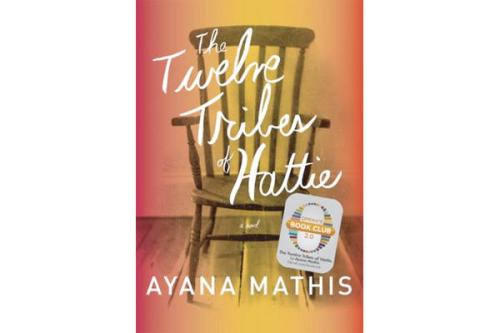The Twelve Tribes of Hattie by Ayana Mathis (Knopf; 256 pages; $24.95).
Reading Ayana Mathis’ epic debut The Twelve Tribes of Hattie, I could not help but think of the poem “A Dream Deferred” by Harlem Renaissance poet Langston Hughes (1902-1967).
What happens to a dream deferred?
Does it dry up
like a raisin in the sun?
Or fester like a sore—
and then run?
Does it stink like rotting meat?
Or crust and sugar over—
like a syrupy sweet?
Maybe it just sags
like a heavy load.
Or does it explode?[1]
Hattie, Mathis’ central character, and her family left their home in Georgia as part of the African-American exodus to the North during the Great Migration. Six million blacks moved out of the rural South to the Northeast, Midwest, and West from around 1910 to 1970.
When their exodus began, slavery had long been abolished. Yet, African-Americans were still very much bound. Segregation, discrimination, and physical violence prompted blacks to hope for better lives in urban centers like Chicago and New York City. Some may have had families in those cities; others set out with uncertainty, knowing no one but desperate for better lives. The dreams of many were fulfilled as they found jobs and discovered new avenues open to them. The dreams of others, as Hughes lyrically laments, were deferred.
Hattie belongs in the latter category. In 1925, she and her husband, August, live in Philadelphia, where they rent a house and where August works long hours. Hattie gives birth to twins, Philadelphia and Jubliee, appellations “that weren’t already chiseled on a headstone in the family plots in Georgia…names of promise and of hope, reaching forward names, not looking back ones.”
The names she chooses for her children are significant. Philadelphia represents their new home, the city of Philadelphia. Hattie has high hopes for her family’s future in this great city. The name then carries with it all of Hattie’s optimisms and dreams. The name Jubilee evokes echoes of the African-American Juneteenth celebrations that marked the end of slavery (the first celebration occurred June 19, 1865). In the North, Hattie’s children are free and do not have to worry about seeing August beaten, as Hattie once saw happen to her own father. In Philadelphia, Hattie is certain that her twins will have opportunities she did not have growing up in Georgia.
When the twins become ill with pneumonia at seven months old, Hattie’s world is shaken. She tries to lessen their cough with eucalyptus, but the plant is difficult to find in Philadelphia. When Hattie finds the plant, she has to buy it. This feels so wrong to her. Back home in Georgia, a eucalyptus tree is located directly “across from Hattie’s house.” Such a stark realization leaves her bitter–especially when she cannot save them.
What happens to a dream deferred? For Hattie, losing the twins is earth-shattering. She feels as if a part of her dies with Philadelphia and Jubilee. Hattie and August go on to have other children, but Hattie is never the same after the tragedy.
For her other offspring to survive in this world, Hattie must harden herself so she can harden them. If they are to survive, then Hattie must be a survivor. She will hold them at arm’s length if it means they will reach adulthood. She will close herself off from them if it means they will grow up.
Mathis then switches gears and focuses on what happens to Hattie’s eleven children and one grand-child, her twelve tribes. When we meet each of Hattie’s progeny in wholly intimate chapters, they are all on the cusp of something: grappling with identity, homophobia, abuse, jealousy, and sickness. Mathis also illustrates through these chapters how Hattie’s children see her as a cold, bitter, and sometimes hateful woman. The structure of the chapters also allows us to see how things change as the years pass. Although Hattie and August grow apart, she still stays with him, even after she has a baby by another man and runs away. She feels bound to August and stays by his side through affairs and economic hardships.
The Twelve Tribes of Hattie cuts to the quick. Mathis employs incisive, gritty dialogue that lodges itself deep in the hearts and guts of readers. She can be elegantly precise yet equally coarse and raw when necessary, showing an amazing range of talent.
For me, Mathis’ other characters pale next to Hattie. The author provides fascinating windows into Hattie’s psyche through her twelve tribes. We know what they do not. We know why she is cold, bitter, and sometimes hateful.
Mathis is by no means using Hattie to represent all African-American women who left the South to make new lives in the North. Instead, Mathis is re-presenting one possible story through the character of Hattie. Mathis wants to show the gritty underbelly of a family who took part in the Great Migration with all the sufferings and ordeals such an epic journey would entail.
Hattie’s dream of a new life did not go the way she had hoped it would. Hattie’s was a dream deferred that festered, crusted over, and dried up. Surely, Hattie would say her heart rotted and stank. Perhaps she exploded from the pain. Hattie had to survive so her children would. What a heavy load she carried. What a stunning literary achievement from Mathis as she chronicles one woman’s trials and tribulations. The Twelve Tribes of Hattie resonates with meaning and with beauty.
[1] Langston Hughes, “Harlem” from Collected Poems. Copyright © 1994 by The Estate of Langston Hughes.





Glad to see another fan. This was the best book I read in January without question. I really appreciate the way she personalized these moments in history.
I can’t wait to see Oprah’s interview with Mathis on Sunday on OWN.